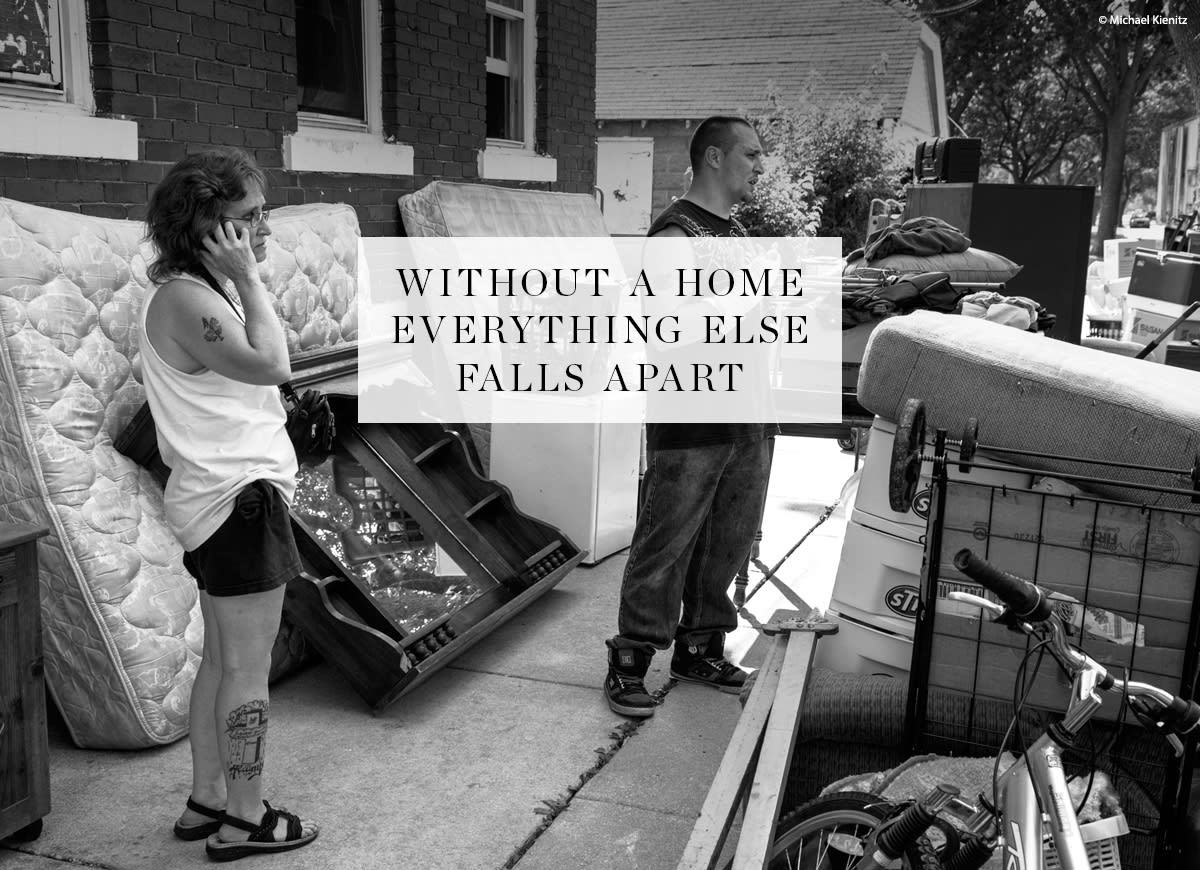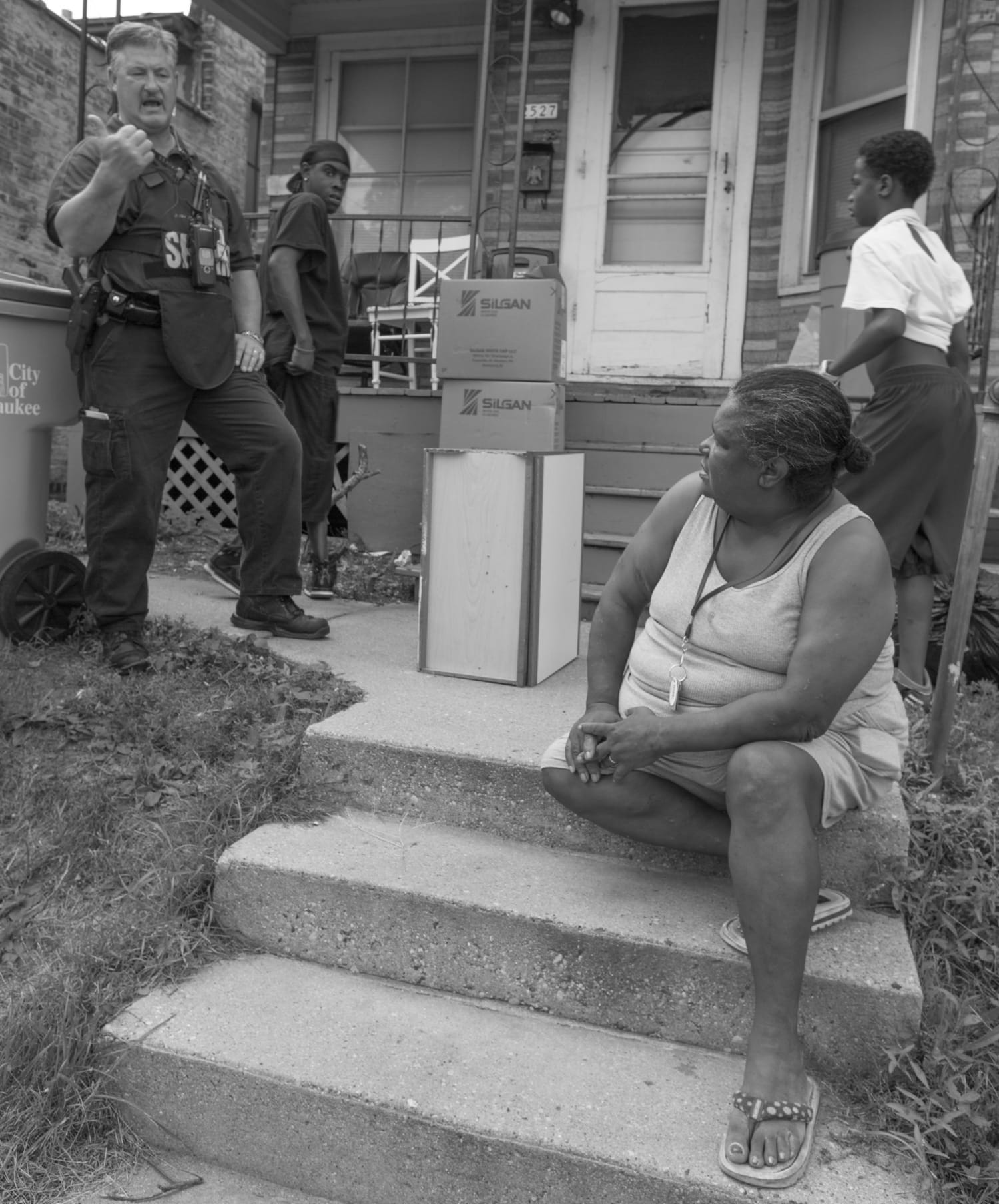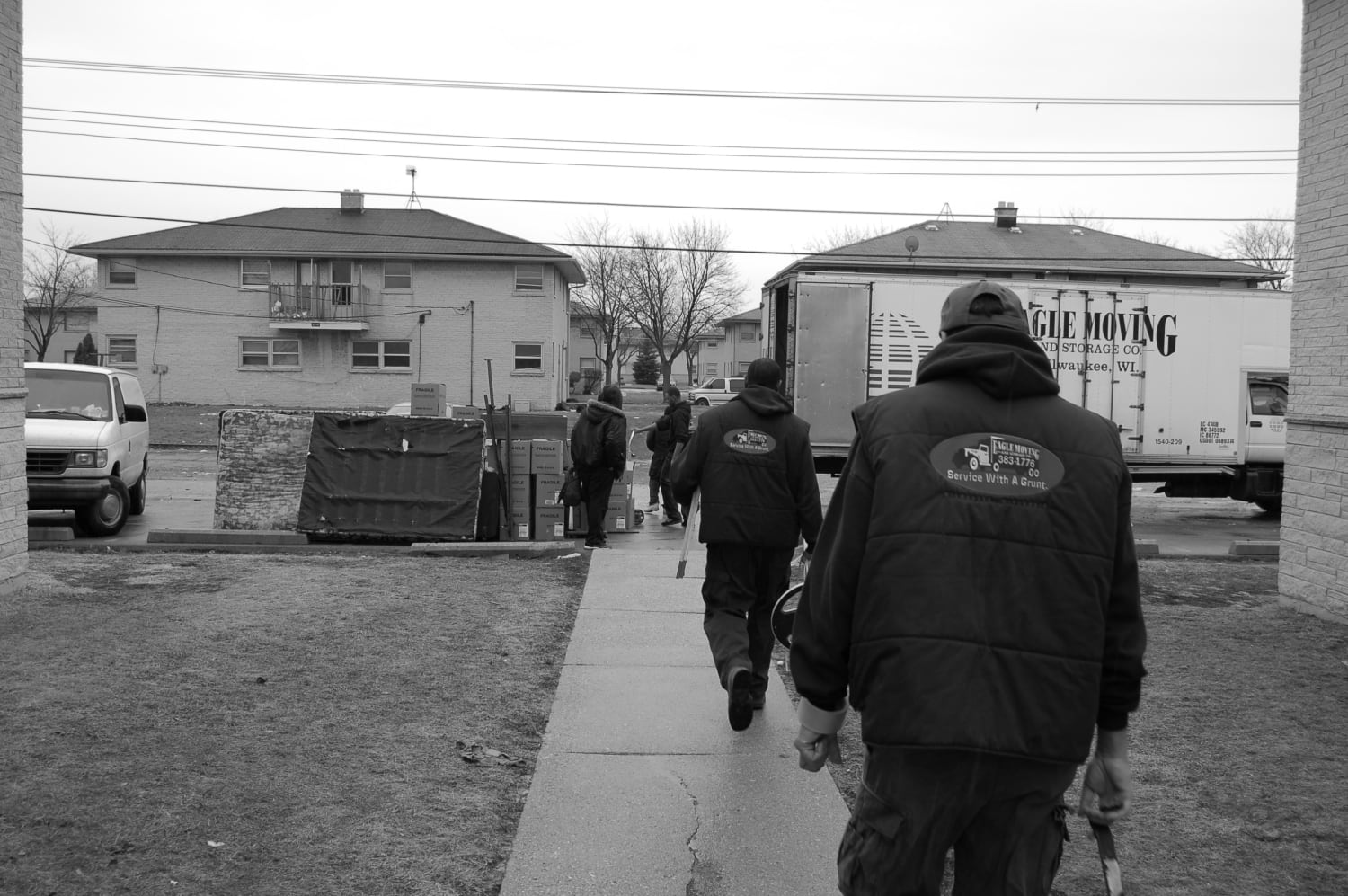
Evicted

NEW YORK TIMES BESTSELLER • WINNER OF THE PULITZER PRIZE • NAMED ONE OF TIME’S TEN BEST NONFICTION BOOKS OF THE DECADE • One of the most acclaimed books of our time, this modern classic “has set a new standard for reporting on poverty” (Barbara Ehrenreich, The New York Times Book Review).
In Evicted, Princeton sociologist and MacArthur “Genius” Matthew Desmond follows eight families in Milwaukee as they each struggle to keep a roof over their heads. Hailed as “wrenching and revelatory” (The Nation), “vivid and unsettling” (New York Review of Books), Evicted transforms our understanding of poverty and economic exploitation while providing fresh ideas for solving one of twenty-first-century America’s most devastating problems. Its unforgettable scenes of hope and loss remind us of the centrality of home, without which nothing else is possible.
NAMED ONE OF THE BEST BOOKS OF THE YEAR BY President Barack Obama • The New York Times Book Review • The Boston Globe • The Washington Post • NPR • Entertainment Weekly • The New Yorker • Bloomberg • Esquire • BuzzFeed • Fortune • San Francisco Chronicle • Milwaukee Journal Sentinel • St. Louis Post-Dispatch • Politico • The Week • Chicago Public Library • BookPage • Kirkus Reviews • Library Journal • Publishers Weekly • Booklist • Shelf Awareness
WINNER OF: The Pulitzer Prize for Nonfiction • The National Book Critics Circle Award for Nonfiction • The PEN/John Kenneth Galbraith Award for Nonfiction • The Andrew Carnegie Medal for Excellence in Nonfiction • The Hillman Prize for Book Journalism • The PEN/New England Award • The Chicago Tribune Heartland Prize • The Barnes & Noble Discover Great New Writers Award • Eastern Sociological Society Komarovsky Book Award • American Bar Association Silver Gavel Award • The Robert F. Kennedy Book Award • The Order of the Coif Biennial Book Award • The Stowe Prize
FINALIST FOR THE LOS ANGELES TIMES BOOK PRIZE AND THE KIRKUS PRIZE
“Evicted stands among the very best of the social justice books.” —Ann Patchett, author of Bel Canto and Commonwealth
“Gripping and moving—tragic, too.” —Jesmyn Ward, author of Salvage the Bones
“Evicted is that rare work that has something genuinely new to say about poverty.” —San Francisco Chronicle
About Matthew Desmond

Photo: © Michael Kienitz
Matthew Desmond is a professor of sociology at Princeton University. After receiving his Ph.D. in 2010 from the University of Wisconsin at Madison, he joined the Harvard Society of Fellows as a Junior Fellow. He is the author of four books, including Evicted: Poverty and Profit in the American City (2016), which won the Pulitzer Prize, National Book Critics Circle Award, and Carnegie Medal, and PEN / John Kenneth Galbraith Award for Nonfiction. The principal investigator of The Eviction Lab, Desmond’s research focuses on poverty in America, city life, housing insecurity, public policy, racial inequality, and ethnography. He is the recipient of a MacArthur “Genius” Fellowship, the American Bar Association’s Silver Gavel Award, and the William Julius Wilson Early Career Award. A contributing writer for the New York Times Magazine, Desmond was listed in 2016 among the Politico 50, as one of “fifty people across the country who are most influencing the national political debate.”
Stay in Touch
By clicking Sign Up, I acknowledge that I have read and agree to Penguin Random House's Privacy Policy and Terms of Use and understand that Penguin Random House collects certain categories of personal information for the purposes listed in that policy, discloses, sells, or shares certain personal information and retains personal information in accordance with the policy. You can opt-out of the sale or sharing of personal information anytime.
Read an Excerpt
WINNER OF THE 2017 PULITZER PRIZE FOR GENERAL NON-FICTION
The Business of Owning the City
Before the city yielded to winter, as cold and gray as a mechanic’s wrench, before Arleen convinced Sherrena Tarver to let her boys move into the Thirteenth Street duplex, the inner city was crackling with life. It was early September and Milwaukee was enjoying an Indian summer. Music rolled into the streets from car speakers as children played on the sidewalk or sold water bottles by the freeway entrance. Grandmothers watched from porch chairs as bare-chested black boys laughingly made their way to the basketball court.
Sherrena wound her way through the North Side, listening to R&B with her window down. Most middle-class Milwaukeeans zoomed past the inner city on the freeway. Landlords took the side streets, typically not in their Saab or Audi but in their “rent collector,” some oil-leaking, rusted-out van or truck that hauled around extension cords, ladders, maybe a loaded pistol, plumbing snakes, toolboxes, a can of Mace, nail guns, and other necessities. Sherrena usually left her lipstick-red Camaro at home and visited tenants in a beige-and-brown 1993 Chevy Suburban with 22-inch rims. The Suburban belonged to Quentin, Sherrena’s husband, business partner, and property manager. He used a screwdriver to start it.
Some white Milwaukeeans still referred to the North Side as “the core,” as they did in the 1960s, and if they ventured into it, they saw street after street of sagging duplexes, fading murals, twenty-four-hour day cares, and corner stores with wic accepted here signs. Once America’s eleventh-largest city, Milwaukee’s population had fallen below 600,000, down from over 740,000 in 1960. It showed. Abandoned properties and weedy lots where houses once stood dotted the North Side. A typical residential street had a few single-family homes owned by older folks who tended gardens and hung American flags, more duplexes or four-family apartment buildings with chipping paint and bedsheet curtains rented to struggling families, and vacant plots and empty houses with boards drilled over their doors and windows.
Sherrena saw all this, but she saw something else too. Like other seasoned landlords, she knew who owned which multifamily, which church, which bar, which street; knew its different vicissitudes of life, its shades and moods; knew which blocks were hot and drug-soaked and which were stable and quiet. She knew the ghetto’s value and how money could be made from a property that looked worthless to people who didn’t know any better.
Petite with chestnut skin, Sherrena wore a lightweight red-and-blue jacket that matched her pants, which matched her off-kilter NBA cap. She liked to laugh, a full, open-mouthed hoot, sometimes catching your shoulder as if to keep from falling. But as she turned off North Avenue on her way to pay a visit to tenants who lived near the intersection of Eighteenth and Wright Streets, she slowed down and let out a heavy sigh. Evictions were a regular part of the business, but Lamar didn’t have any legs. Sherrena was not looking forward to evicting a man without legs.
When Lamar first fell behind, Sherrena didn’t reach automatically for the eviction notice or shrug it off with a bromide about business being business. She hemmed and hawed. “I’m gonna have a hard time doing this,” she told Quentin when she could no longer ignore it. “You know that, don’t you?” Sherrena frowned.
Quentin stayed quiet and let his wife say it.
“It’s only fair,” Sherrena offered after a few silent moments of deliberation. “I feel bad for the kids. Lamar’s got them little boys in there. . . . And I love Lamar. But love don’t pay the bills.”
Sherrena had a lot of bills: mortgage payments, water charges, maintenance expenses, property taxes. Sometimes a major expense would come out of nowhere—a broken furnace, an unexpected bill from the city—and leave her close to broke until the first of the month.
“We don’t have the time to wait,” Quentin said. “While we waiting on his payment, the taxes are going up. The mortgage payment is going up.”
There was no hedging in this business. When a tenant didn’t pay $500, her landlord lost $500. When that happened, landlords with mortgages dug into their savings or their income to make sure the bank didn’t hand them a foreclosure notice. There were no euphemisms either: no “downsizing,” no “quarterly losses.” Landlords took the gains and losses directly; they saw the deprivation and waste up close. Old-timers liked recalling their first big loss, their initial breaking-in: the time a tenant tore down her own ceiling, took pictures, and convinced the court commissioner it was the landlord’s fault; the time an evicted couple stuffed socks down the sinks and turned the water on full-blast before moving out. Rookie landlords hardened or quit.
Sherrena nodded reassuringly and said, almost to herself, “I guess I got to stop feeling sorry for these people because nobody is feeling sorry for me. Last time I checked, the mortgage company still wanted their money.”
Sherrena and Quentin had met years ago, on Fond Du Lac Avenue. Quentin pulled up beside Sherrena at a red light. She had a gorgeous smile and her car stereo was turned up. He asked her to pull over. Sherrena remembered Quentin being in a Daytona, but he insisted it was the Regal. “I ain’t trying to pull nobody over in the Daytona,” he’d say, feigning offense. Quentin was well manicured, built but not muscular, with curly hair and lots of jewelry—
a thick chain, a thicker bracelet, rings. Sherrena thought he looked like a dope dealer but gave him her real number anyway. Quentin called Sherrena for three months before she agreed to let him take her out for ice cream. It took him another six years to marry her.
When Quentin pulled Sherrena over, she was a fourth-grade teacher. She talked like a teacher, calling strangers “honey” and offering motherly advice or chiding. “You know I’m fixing to fuss at you,” she would say. If she sensed your attention starting to drift, she would touch your elbow or thigh to pull you back in.
Four years after meeting Quentin, Sherrena was happy with their relationship but bored at work. After eight years in the classroom, she quit and opened a day care. But “they shut it down on a tiny technicality,” she remembered. So she went back to teaching. After her son from an earlier relationship started acting out, she began homeschooling him and tried her hand at real estate. When people asked, “Why real estate?” Sherrena would reply with some talk about “long-term residuals” or “property being the best investment out there.” But there was more to it. Sherrena shared something with other landlords: an unbending confidence that she could make it on her own without a school or a company to fall back on, without a contract or a pension or a union. She had an understanding with the universe that she could strike out into nothing and through her own gumption and intelligence come back with a good living.
Sherrena had bought a home in 1999, when prices were low. Riding the housing boom a few years later, she refinanced and pulled out $21,000 in equity. Six months later, she refinanced again, this time pulling $12,000. She used the cash to buy her first rental property: a two-unit duplex in the inner city, where housing was cheapest. Rental profits, refinancing, and private real-estate investors offering high-interest loans helped her buy more.
She learned that the rental population comprised some upper- and middle-class households who rent out of preference or circumstance, some young and transient people, and most of the city’s poor, who were excluded both from homeownership and public housing. Landlords operated in different neighborhoods, typically clustering their properties in a concentrated area. In the segregated city, this meant that landlords focused on housing certain kinds of people: white ones or black ones, poor families or college students. Sherrena decided to specialize in renting to the black poor.
Four years later, she owned thirty-six units, all in the inner city, and took to carrying a pair of cell phones with backup batteries, reading Forbes, renting office space, and accepting appointments from nine a.m. to nine p.m. Quentin quit his job and started working as Sherrena’s property manager and buying buildings of his own. Sherrena started a credit-repair business and an investment business. She purchased two fifteen-passenger vans and started Prisoner Connections LLC, which for $25 to $50 a seat transported girlfriends and mothers and children to visit their incarcerated loved ones upstate. Sherrena had found her calling: inner-city entrepreneur.
Download the Reading Guides
A Harsh Reality
Evictions used to be rare. They used to draw crowds. But times have changed. All over America, housing costs have soared. For many poor families, eviction has become a way of life.

Photo: © Michael Kienitz

Photo: © Michael Kienitz

Photo: © Michael Kienitz

Photo: © Matthew Desmond

Photo: © Matthew Desmond

Photo: © Michael Kienitz

Photo: © Matthew Desmond

Photo: © Michael Kienitz

Photo: © Matthew Desmond

Photo: © Matthew Desmond
Media
On the Media with Brooke Gladstone, “The Scarlet E: Unmasking America’s Eviction Crisis” series, June 2019
Fresh Air with Terry Gross, “First-Ever Evictions Database Shows: ‘We’re In the Middle Of A Housing Crisis,’” April 12, 2018
The New York Times, interviewed for The Upshot, “In 83 Million Eviction Records, a Sweeping and Intimate New Look at Housing in America,” April 7, 2018
The American Bar Association: “2017 Silver Gavel Awards: Winner for Books,” July 2017
The Sunday Times: “‘Evicted: Poverty and Profit in the American City,’ by Matthew Desmond,” March 20, 2016
TalkPoverty Radio: “‘Evicted,’” March 18, 2016
Huffington Post: “How the Eviction Epidemic is Trapping Black Women in Poverty,” March 17, 2016
Slate: “Why More Americans Are Getting Evicted,” March 17, 2016
Vice: “Reviews: March 2016,” March 16, 2016
Sapiens: “Out! ‘Curb’ or ‘Truck?,’” March 16, 2016
Deseret News: “Why Eviction is a Cause, Not Just a Condition of Poverty,” March 15, 2016
Alternet: “Matthew Desmond Will Change The Way You Related to America’s Poverty Crisis,” March 14, 2016
Rooflines – The Shelterforce Blog: “Matthew Desmond’s ‘Evicted’ Supports, Challenges Housing Field,” March 14, 2016
The Kansas City Star: “‘Evicted’ Author Matthew Desmond, Who Lived With Milwaukee’s Poor, to Visit KC,” March 12, 2016
The Guardian: “Matthew Desmond: ‘I Want My Work to Bear Witness to This Problem That’s Raging In Our Cities,” March 11, 2016
The New York Review of Books: “Kicked Out in America,” March 10, 2016 Issue
The Chicago Tribune: “Matthew Desmond’s ‘Evicted’ Details Cost of Evictions on Milwaukee’s Poor,” March 10, 2016
KCUR Radio Station: “‘Evicted: Poverty and Profit in the American City,‘” March 9, 2016
The Diane Rehm Show – Interview with Diane Rehm: “Matthew Desmond: ‘Evicted,’” March 7, 2016
The National Book Review: “5 Hot Books: A Heartbreaking Account of Families Being Evicted, The Secrets of Being Productive, And More,” March 7, 2016
Science of Us – NYMag.com: “What Happens to People Who Get Evicted Over and Over and Over,” March 4, 2016
Vulture: “8 Books You Need to Read This March,” March 4, 2016
Washington Post: “If You Lose Your Home, You Lose Everything Else, Too,” March 3, 2016
Marketplace – American Public Media: “The Face of the Eviction Epidemic: Mothers and their Children,” March 2, 2016
Christian Science Monitor: “‘Evicted’ Follow the Harrowing, Heartbreaking Cases of Eight Families,” March 2, 2016
San Francisco Chronicle: “‘Evicted: Poverty and Profit in the American City’ by Matthew Desmond,” March 2, 2016
Mother Jones: “Having Kids Makes You More Likely to be Evicted,” March 1, 2016
The Atlantic: “America’s Insidious Eviction Problem,” March 1, 2016
WUWM: Milwaukee Public Radio:
Articles by Matt
The New York Times Magazine, “The $15 Minimum Wage Doesn’t Just Improve Lives. It Saves Them,” February 22, 2019
The New York Times Magazine, “Americans Want to Believe Jobs Are the Solution to Poverty. They’re Not,” September 11, 2018
The Atlantic, “Where Have All the Rioters Gone?,” February 2018 issue
The New York Times Magazine, “How Homeownership Became the Engine of American Inequality,” May 9, 2017
The New York Times: “Why Don’t You Just Call the Cops?,” with Andrew V. Papachristos, September 30, 2016
The New York Times: “The Eviction Economy,” March 5, 2016
Huffington Post / New York Legal Assistance Group: “Guest Blog: The Eviction Epidemic In Our Midst,” March 4, 2016
The New Yorker: “Forced Out,” January 31, 2016
The New York Times: “Electing to Ignore the Poorest of the Poor,” November 17, 2015
Institute for Research on Poverty: “Unaffordable America: Poverty, Housing and Eviction,” March 2015
Aljazeera America: “Under Local Laws, 911 Calls Turn Domestic Abuse Victims into ‘Nuisances,'” December 8, 2014
The New York Times: “Evictions Soar in Hot Market; Renters Suffer,” August 28, 2014
The Washington Post: “Evictions: A Hidden Scourge for Black Women,” June 16, 2014
The Journal Sentinel: “Domestic Violence Victims in Milwaukee Faced Eviction for Calling Police, Study Finds,” August 18, 2013
The New York Times: “Victims’ Dilemma: 911 Calls Can Bring Eviction,” August 16, 2013
The New York Times: “Fighting Wildfires, Processing Death,” July 6, 2013
ABC Australia: “US still suffering worst housing crisis in 70 years,” March 20, 2013
Books & Ideas: “Exploiting the Urban Poor,” February 18, 2013
The New York Times: “Tipping the Scales in Housing Court,” November 29, 2012
The New York Times: “Is Poverty a Kind of Robbery?,” September 16, 2012
Chicago Tribune: “Housing Crisis in the Inner City,” April 18, 2010
The New York Times: “A Sight All Too Familiar in Poor Neighborhoods,” February 18, 2010
Get Involved
Want to help families avoid eviction or recover after being displaced?
Have an eviction story you’d like to share?
JustShelter.org
Contact
For media inquiries, please contact Penny Simon, Penguin Random House: psimon@penguinrandomhouse.com | (212) 572-2086
For speaking requests, please contact Miriam Feuerle, Lyceum Agency: miriam@lyceumagency.com.
For signed copies, personalized, contact the Harvard Coop at customerservice@thecoop.com.
